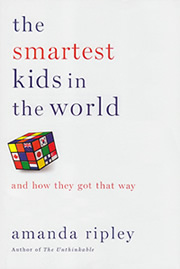Amanda Ripley's new book, The Smartest Kids in the World: And How They Got That Way, has garnered positive reviews in the Economist, the New York Times, USA Today, the Daily Beast and US News and World Report.
Is it really that good?
It's pretty darn good.
As the subtitle promises, Ripley sets out tell the education success stories of three countries: Finland and South Korea (whose 15 year olds score very high on the PISA test) and Poland (offered as an example of a country in transition, and making significant progress).
What's Ripley's answer to the subtitle? They got that way by engaging, from an early age, in rigorous work that poses significant cognitive challenge. In other words, the open secret is the curriculum.
Along the way to this conclusion, she dispenses with various explanations for US kids mediocre performance on the science and math portions of PISA. I've made these arguments myself so naturally I found them persuasive:
- Poverty is higher in the US. Not compared to Poland. And other countries with low poverty (e.g. Norway) don't end up with well educated kids. The relevant statistic is how much worse poor kids do relative to rich kids within a country. The US fares poorly on this statistic.
- The US doesn't spend enough money on education. Actually we outspend nearly everyone. But because of local funding we perversely shower money on schools attended by the wealthy and spend less on the schools attended by poor kids.
- The US has lots of immigrants and they score low. Other countries do a better job of educating kids who do not speak the native language.
- The kids in other countries who take PISA are the elite. Arguably true in Shanghai, but not Korea or Finland, both of which boast higher graduation rates than the US.
- Why should we compare our kids to those of foreign countries? It's not a race. Because those other kids are showing what we could offer our own children, and are not.
What is the explanation? According to Ripley, there is a primary postulate running through the psyche of South Koreans, Finns, and Poles when it comes to education: an expectation that the work will be hard. Everything else is secondary. So anything that gets in the way, anything that compromises the work, will be downplayed or eliminated. Sports, for example. Kids do that on their own time, and it's not part of school culture.

If the academic work for students will be difficult, teachers will necessarily have to be very carefully selected and well trained. And you'll do whatever is necessary to make that happen. Even if it means, as in Finland, offering significant financial support during their training.
So what is the primary postulate of American education?
Ripley doesn't say, and I'm not sure Americans are sufficiently unified to name one. But two assumptions strike me as candidates.
First, that learning is natural, natural meaning that a propensity to learn is innate, instinctive and therefore inevitable. That, in turn, means that it should be easy. This assumption is pretty much the opposite of the one Ripley assigns to South Korea, Finland, and Poland.
Many Americans seem to think that it's not normal for schoolwork to be challenging enough that it takes persistence. In fact, if you have to try much harder than other kids, in our system you're a good candidate for a diagnosis and an IEP.
This expectation that things should be easy may explain our credulity for educational gimmicks, for that's what gimmicks do: they promise to make learning easy for everyone. Can't learn math? It's because your learning style hasn't been identified. Trouble with Spanish? This new app will make it fun and effortless.
The second assumption I often see is that "rigor" and "misery" are synonyms. Rigor means that you will be challenged. It means you may not succeed quickly. It means your cognitive resources will be stretched. It doesn't mean you are being punished, nor that you will be unhappy.
At the same time, I can't agree with the "play is all you need" crowd. Play can be cognitively enriching, but that doesn't mean that all play is cognitively enriching.
It's easy to create schoolwork that's rigorous and a grind likely to make kids hate school. Ripley offers South Korea as an example. Children there are miserable, adults hate the system, and despite kids' excellent test scores, everyone sees the Korean system as dysfunctional.
It's much tougher to educate kids in a way that is challenging but engaging. That's Finland, according to Ripley. And she's here to remind us that most of what has been pointed to as responsible for the Finnish miracle is not. What's responsible is the rigor of the work kids have been asked to do.
Will Americans embrace this idea, and demand that our education system challenge our kids? Will they embrace it to the point that they will follow this primary postulate whither it may lead?
I think Ripley's right to suggest that it's essential. I think the odds that Americans will follow through are remote.
 RSS Feed
RSS Feed